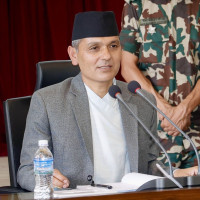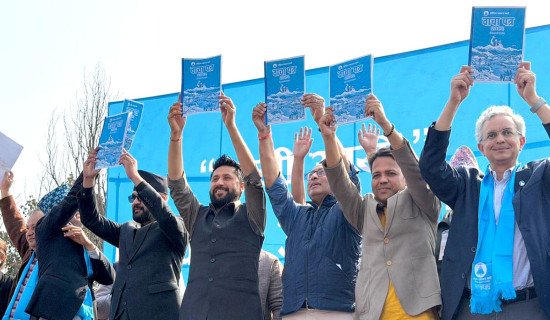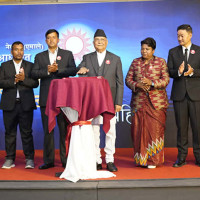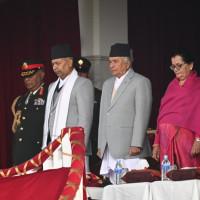- Friday, 20 February 2026
Over 71 per cent polling stations deemed sensitive
BY A STAFF REPORTER, Kathmandu, Nov. 16: The government has identified over 3,000 polling stations as most sensitive and over 4,000 as sensitive from the election security point of view to conduct the elections to the House of Representatives and Provincial Assemblies slated for November 20.
According to the Ministry of Home Affairs (MoHA), reports made available from the respective district security committee headed by chief district officer have identified 3,065 as most sensitive polling stations out of a total of 10,888 fixed by the Election Commission Nepal (ECN). The ECN is conducting the election in a single phase.
Similarly, 4,478 polling stations have been identified as sensitive because of different underground political parties and armed outfits which have been threatening to disrupt the election environment at any time. The remaining – 3,345 polling stations – have been deemed to be general ones.
Over 28 political parties, which are not under the mainstream of national politics, are all enlisted as threatening forces which might disrupt the election under any pretext, a source at the Ministry of Home Affairs told The Rising Nepal on a condition of anonymity Tuesday.
“We cannot disclose any of such information as to which places and districts are most sensitive or sensitive because doing so will assist such hostile forces in executing their nefarious plan,” the source at the Ministry said.
Since the Communist Party of Nepal-Revolutionary led by Netra Bikram Chand ‘Biplav’ a week ago had threatened to boycott the election, the government has been taking the issue seriously and has beefed up security ahead of the election.
Spokesperson for the Home Ministry and Joint Secretary Fanindra Mani Pokharel said that in view of the latest security threat, there may be a need to change the election security strategy.
However, he said that the government has already formulated a security strategy looking at the worst-case scenario.
"We have made a security strategy analysing the possible worst situation. If something needs to be changed in such a plan, it can be done and reviewed anytime," said Pokharel.
“Any district of any province could be under security threat at any time because unwanted elements may be at any place to show us our security loopholes and make their presence felt among the public, creating fear among the voters,” DIG Tek Prasad Rai, Spokesperson for the Nepal Police Headquarters, said.
“We can’t tell you the district and province directly because it will automatically help such forces to prepare additional security threats to the government,” DIG Rai said.
Most sensitive and sensitive provinces
From Rolpa and Rukum East of Lubmini Province, Rukum West from Karnali Province to eastern Nepal’s Province 1 and Madhes Province are listed at the most sensitive and sensitive areas from the security point of view of the government, said Rai. Polling centres, where the May 13 local election was disrupted, are also under close scrutiny of the government, he said.
During local poll on May 13, elections in 85 polling centres had to be postponed and had to go for re-polls, according to the record of ECN. Some of them include, Dakneshwari Municipality in Saptari district, Raskot and Pachaljharana Rural Municipalities in Kalikot and Jaya Prithvi Municipality in Bajhang, Shahidbhumi Rural Municipality in Dhankuta, Khandadevi Municipality in Ramechhap, Kedarsyun Rural Municipality and Surma Rural Municipality centre-1 and 2 in Bajhang and centre-2 of Panchkhal Municipality in Kavrepalanchok.
Parties opposed to election Most of those opposing the general election are fringe leftist groups that have broken away from the CPN-Maoist.
Three such fringe left parties include: The Nepal Communist Party led by Biplav, also known as Biplav Group, Nepal Communist Party led by Rishi Ram Kattel and the Scientific Socialist Communist Party headed by Ahuti.
In addition, the Communist Party of Nepal (Revolutionary Maoists) led by Mohan Baidya and the CPN Bahumat led by Dharmendra Bastola, which broke away from the Chand group, have also announced that they will boycott the election.















